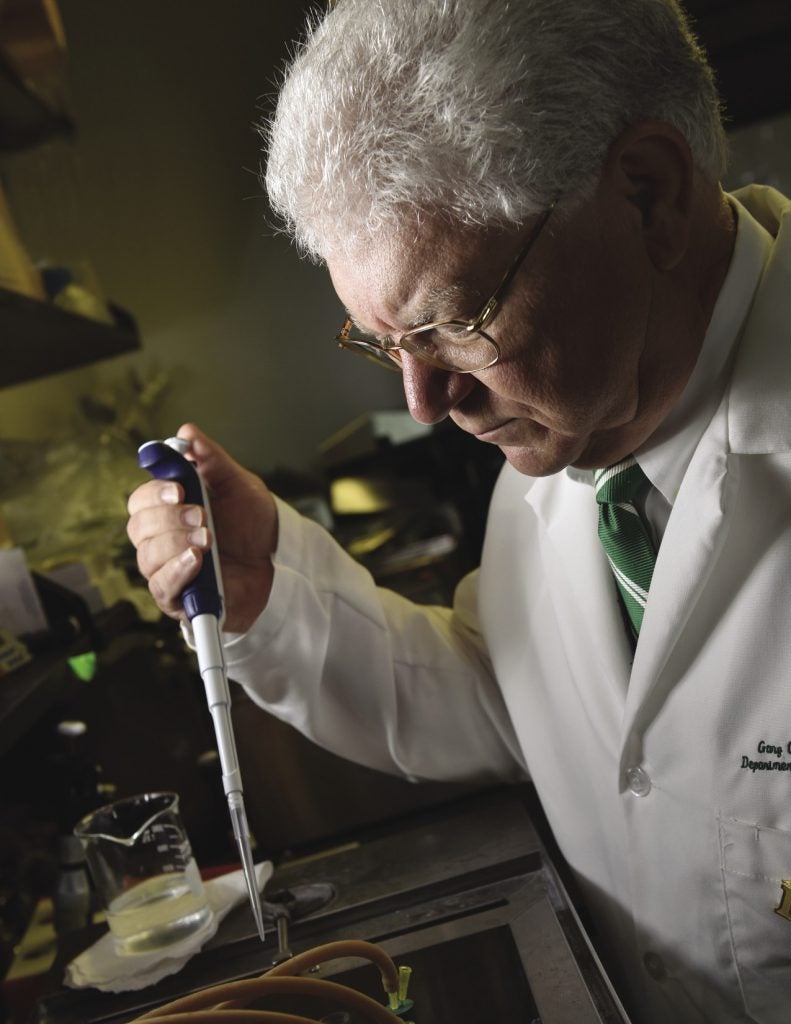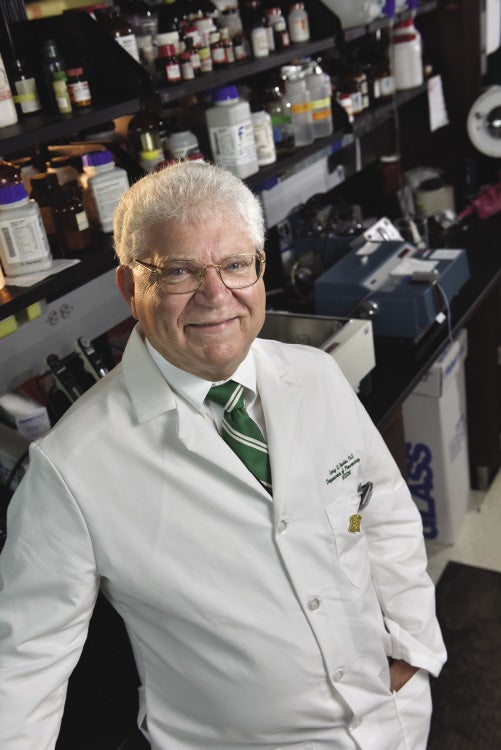 Dr. Gary Rankin takes the reins as vice dean of basic sciences, and continues his success at building up Marshall University’s biomedical sciences.
Dr. Gary Rankin takes the reins as vice dean of basic sciences, and continues his success at building up Marshall University’s biomedical sciences.
His mission is simple — work hard, play hard — all with the goal of helping others.
Dr. Gary Rankin joined the Marshall University Joan C. Edwards School of Medicine faculty in 1978, making him one of the school’s last remaining original faculty members.
Rankin said Marshall’s medical school appealed to him as it was still in its early stages of development and he saw an opportunity to be a part of something special.
“Most of what I’ve done, I’ve done because it benefits other people,” Rankin said. “I’m not about benefiting myself. People need all the help they can get, so I’ve tried to do that.”
Rankin, a medicinal chemist and kidney toxicologist, has always had a love of science and originally wanted to be an astronaut. Unfortunately, a childhood leg injury prevented that dream from becoming a reality.
“I had to reevaluate career choices and thought, ‘I have all As in chemistry, I’ll be a chemist,’ and I fell in love with organic chemistry,” Rankin said. “It was a natural choice. And the idea of being able to create something no one had ever created before really fascinated me.”
Rankin graduated in 1972 from the University of Arkansas at Little Rock with a Bachelor of Science degree in chemistry. He continued his education at the University of Mississippi, graduating in 1976 with a Ph.D. in medicinal chemistry, and then completed his schooling at the Medical College of Ohio with a fellowship in pharmacology from 1976-1978.
Rankin started at Marshall as an assistant professor of pharmacology. Since then, he has worked his way up to his current position as vice dean of basic sciences and chair of the newly formed department of biomedical sciences.
Joseph Shapiro, M.D., dean of the School of Medicine, said the school’s departments of biochemistry, microbiology, anatomy, pharmacology, physiology, toxicology and animal resources have been combined to create a new basic sciences unit, which results in one biomedical sciences department.
With Rankin’s more than 25 years experience as a department chair and his history of receiving grant funding, he was the natural choice to serve as vice dean and chair, Shapiro said.
“Gary’s just a wonderful institutional citizen,” he said. “He’s a really selfless person who strives to make people around him look better and do better. He’s, frankly, well respected by absolutely everybody and loved by everybody in the basic sciences. So, he’s the logical person to put in this position. I also have a great personal relationship and understanding with Gary where we share values and both see very similar needs the institution faces.”
 Rankin said the restructuring allows Marshall to stay competitive and shape its courses around research interests and common themes, such as chronic diseases or addiction.
Rankin said the restructuring allows Marshall to stay competitive and shape its courses around research interests and common themes, such as chronic diseases or addiction.
The new biomedical sciences department is also heavily benefited by the IDeA Network of Biomedical Research Excellence grant, or INBRE, which is a competitive federal research program established by the National Institutes of Health in 2004.
Rankin has been the principal investigator for the West Virginia INBRE program over the last 12 years. In that time, West Virginia has been awarded more than $54 million in federal funds, which results in an economic impact of more than $120 million. As of August 2014, the grant was renewed for another five years.
“West Virginia has been a state, like other states I’ve lived in — Arkansas and Mississippi — that really hasn’t had the advantages other states have had,” Rankin said. “This is a program that really is designed to build biomedical research infrastructure statewide.”
Rankin said the INBRE program benefits West Virginia in a number of ways. It funds research grants at undergraduate schools around the state and allows students to work with faculty members on research projects. In addition, each summer, Marshall and West Virginia University, the other lead institution in the INBRE program, host a nine-week-long summer program for students in which they complete research projects, as well as learn about the ethics and safety matters involved in the research process. The students present their research findings at the end of the summer in a symposium that alternates between Marshall and West Virginia University.
The West Virginia INBRE program also works with the Health Sciences and Technology Academy, or HSTA, which is a community-based math and science program for ninth through 12th grade students supported by an NIH award to West Virginia University. HSTA exists in 26 West Virginia counties, and primarily benefits minority and underrepresented students from rural communities. West Virginia INBRE works with HSTA to help recruit students from its pool of participants to attend one of the INBRE institutions in the state and offer the HSTA Scholars opportunities to conduct biomedical research.
“We get to do a lot for West Virginia. That’s why I decided to get involved with INBRE,” Rankin said. “It’s really been something that’s helped the state, and has helped Marshall.”
Even when he’s not working, Rankin said he and his wife, Monica A. Valentovic, Ph.D., another member of Marshall’s faculty, still conduct science experiments — just in a different way.
“We grow roses,” Rankin said. “When we started dating, she came over to my house and said, ‘Oh, I see you have a few roses growing in the backyard, could I add some?’ Next thing I knew 25 roses show up that we were planting in the backyard.”
Rankin and Valentovic started growing roses and entering competitions in the early 1990s. Though the first several tries didn’t earn them any prizes, they didn’t give up.
“I said, ‘Look, we’re scientists. Look around this room at all these beautiful roses. There’s a formula for how you get there and we can do it,’” he said.
And they did. Since then, Rankin and Valentovic have won more than 600 trophies, and now have about 300 rose bushes of all kinds at home. A friend even named two roses for them. The “Dr. Gary Rankin” is an orange miniature, and the “Dr. Monica Valentovic” is an orange hybrid tea, both of which grow in their garden.
“It’s a lot of fun and we’ve met a lot of great people doing it,” Rankin said.
Rankin is also an experienced birder and has traveled the world in search of different species of birds. So far, he’s seen 769 different types of birds in North America.
“I’m hardcore about it,” he said.
Of his life and his work, Rankin said his mantra is, “work hard, play hard.”
“I love this area and I love the people here,” he said. “I’ve had chances to leave, but I think I can make a difference here and improve the quality of life for others. So, as long as I have the opportunity to do that and I have my birds and my roses, I can’t complain.”
Rebecca Stephens is the managing editor of the Marshall Magazine.
Photos: In his spare time, Dr. Rankin is a veteran birder. He and his wife, Monica A. Valentovic, also a member of Marshall’s faculty, are also award-winning rosarians.
 Dr. Gary Rankin takes the reins as vice dean of basic sciences, and continues his success at building up Marshall University’s biomedical sciences.
Dr. Gary Rankin takes the reins as vice dean of basic sciences, and continues his success at building up Marshall University’s biomedical sciences.